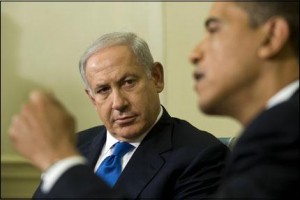
A senior Israeli official voiced disappointment in the Obama administration on Sunday, saying “election-year considerations” lay behind its caution over tough Iran sanctions sought by U.S. legislators.
While Washington has been talking tougher about Iran’s nuclear work and threat to block oil export routes out of the Gulf if hit with harsher sanctions, new U.S. measures adopted on December 31 gave President Barack Obama leeway on the scope of penalties on the Iranian central bank and oil exports.
Moshe Yaalon, Israel’s vice prime minister, contrasted the administration’s posture to that of France and Britain, which he said “are taking a very firm stand and understand sanctions must be imposed immediately.”
“In the United States, the Senate passed a resolution, by a majority of 100-to-one, to impose these sanctions, and in the U.S. administration there is hesitation for fear of oil prices rising this year, out of election-year considerations,” Yaalon told Israel Radio.
“In that regard, this is certainly a disappointment, for now.”
The Democratic president says he is determined to deny Tehran — which insists its nuclear programme is for peaceful needs only — the means to develop an atom bomb. His aides cast their sanctions strategy as a bid to work collaboratively with foreign powers and win over states that import Iranian oil without triggering price-boosting shocks to energy markets.
MIXED MESSAGES
The remarks by Yaalon, a member of Prime Minister Benjamin Netanyahu’s right-wing Likud party, appeared to jar with praise centrist Defence Minister Ehud Barak offered last month for what he described as Obama’s resolve against Iran.
Running for re-election in the face of Republicans who hold sway over big pro-Israel constituencies, Obama has sought to burnish his credentials as a friend of the Jewish state despite having frosty relations with Netanyahu.
In a phone conversation with the prime minister on Thursday, Obama “reiterated his unshakable commitment to Israel’s security,” the White House said. Both sides said the leaders’ discussion dealt with Iran and Israeli-Palestinian peacemaking.
Reputed to have the Middle East’s only nuclear arsenal, Israel sees the makings of a mortal threat in Iran’s uranium enrichment and missile projects, and has threatened to resort to force if it deems diplomatic isolation of its foe a dead end.
The prospect of Israel worsening regional instability with a unilateral strike has stirred worry in war-weary Washington.
Obama’s top military adviser, Joint Chiefs of Staff Chairman General Martin Dempsey, was due to make his first visit to Israel on Thursday.
Israeli media predicted Dempsey would seek to persuade his hosts not to “surprise” the United States on Iran. The U.S. embassy had no immediate information about the visit’s agenda.
Yaalon, himself a former top armed forces commander, said Israel should not “leap forward” to attack Iran.
“But Israel has to be ready to defend itself,” he said. “Let’s hope we do not arrive at that moment.”
Netanyahu sounded sanguine last week about the efficacy of big-power pressure on Iran, telling an Australian newspaper: “For the first time I see Iran wobble … under the sanctions that have been adopted and especially under the threat of strong sanctions on their central bank.”
Reuters

Leave a Reply
You must be logged in to post a comment.